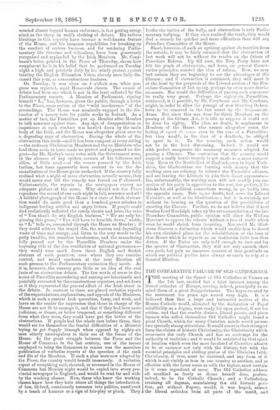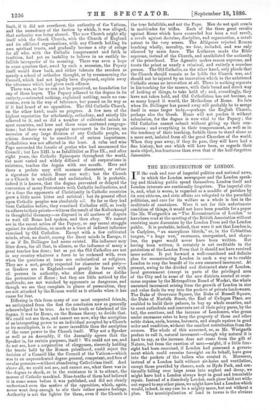THE COMPARATIVE FAILURE OF OLD CATHOLICISM.
THE meeting of the Synod of Old Catholics at Vienna on the 7th inst. excited but a faint interest among the liberal orthodox of Europe, serving, indeed, principally to re- mind them of a great disappointment. The hopes created by the movement ten years ago soared very high. It was believed then that a large and instructed section of the Roman Catholic world, alienated by the declaration of Papal infallibility as a dogma, were ready for open protest, if not for schism, and that the erudite divines, liberal priests, and pious laymen who called themselves Old Catholics might found a great Church, which for many Christian minds would possess two specially strong attractions. It would assert in their strongest form the claims of historic Christianity, the Christianity which reverences the early Church and has no contempt for the authority of tradition ; and it would be untainted by that spirit of localism which even the most localised of Churches admits to be at variance not only with the history, but with the essential principles and abiding genius of the Christian faith. Christianity, if true, must be universal, and any form of it which is not visibly as true in one country as another, and as effective with the lower races as with the higher, must contain in it some ingredient of error. The Old Catholics address all mankind as freely as Rome herself does, profess, indeed, to be the Catholic Church ; and a Catholicism retaining all dogmas, maintaining the old historic posi- tion, yet without Popery, would, it was hoped, attract the liberal orthodox from all parts of the world, and
limit, if it, did not overthrow, the authority of the Vatican, and the ascendency of the faction by which, it was alleged, that authority was being abused. The new Church might ally
itself with the Greek Church, with the Church of England and its affiliated organisations, with any Church holding its own spiritual tenets, and gradually become a city of refuge
for all who, with the Catholic temperament and faith in tradition, had yet an inability to believe in an earthly in- fallible interpreter of its meaning. There was even a hope in some quarters that, awed by such a secession, the Papacy itself would draw back, and either tolerate the seceders as merely a school of orthodox thought, or by resummoning the Council, which had not legally been dispersed, explain away the utterance which had given such offence.
There was, so far as can yet be perceived, no foundation for any of these hopes. The Papacy adhered to the dogma in its entirety,—retracted nothing, explained nothing, made no con- cession, even in the way of tolerance, but passed on its way as if it had heard of no opposition. The Old Catholic Church, on the other hand, made no progress. A few men of the highest reputation for scholarship, orthodoxy, and saintly life adhered to it, and so did a number of cultivated minds in most countries, and here and there some scattered congrega- tions but there was no popular movement in its favour, no secession of any large division of any Catholic people, no schism deserving to be considered of serious importance.
Catholicism was not affected in the least. A calm and wise Pope succeeded the fanatic of genius who had summoned the
Council ; but Leo XIII. is as Infallibilist as Pius IX., and after eight years, the Catholic Episcopate throughout the world, the most varied and widely diffused of all corporations in existence, teaches the dogma with one mouth. Here and there a prelate may still murmur discontent, or refuse a signature for which Rome can wait ; but the Church as a Church is undivided and undisturbed. It is probable, indeed it is known, that the dogma prevented or delayed the conversion of many Protestants with Catholic inclinations, and for a time the opponents of Christianity in Catholic countries grew a little more bitter and satirical ; but its general effect upon Catholic peoples was absolutely nil. So far as they had been Catholics before, they remained Catholics still, as ready to adhere to their priests—witness the result of the Kulturkampf in thoughtful Germany—as disposed in all matters of dispute to wait till Rome had spoken, and then obey. We cannot see in the recent action of the Papacy, or any recent struggle against its absolutism, so much as a trace of indirect influence exercised by Old Catholics. Except with a few cultivated minds, often, no doubt, among the finest minds in Europe, it is as if Dr. Dollinger had never existed. His influence may filter down for all that, in silence, as the influence of many a great teacher has done ; but as yet the Old Catholics are not in any country whatever a force to be reckoned with, even when the questions at issue are ecclesiastical or religious. They are a sect, greatly, respected for character and piety— as Quakers are in England—and greatly in favour with all persons in authority, who either distrust or dislike the pretensions of Rome ; but they are little noticed by the multitude, are not watched by opponents as dangerous, and though we see they complain in places of persecution, they are not attacked by the Roman world as it attacks when it has cause for fear.
Differing in this from many of our most respected friends, we anticipated from the first the conclusion now so generally acknowledged to be true. As to the truth or falsehood of the dogma, it was for Rome, on the Roman theory, to decide that. We could not see then, and cannot see now, why the ascription of an interpreting power to an individual accepted by a Church as its mouthpiece, is in se more incredible than the ascription of the same power to the Church itself. Why not a Speaker as well as an Assembly, if the Assembly agrees that the Speaker is, for certain purposes, itself ? We could not see, and do not see, how a corporation of clergymen, sincerely holding the tenets held by the Roman priesthood, could reject the decision of a Council like the Council of the Vatican—which was to an unprecedented degree general, competent, and free of secular pressure—without abandoning Catholicism itself. And above all, we could not see, and cannot see, what there was in the dogma to shock, or in the resistance to it to attract, the roams of Catholic mankind. Nine-tenths of them had believed it in some sense before it was published, and did not clearly understand even the motive of the opposition, which, again, never went deep enough to stir their rather passive feelings. Authority is not the lighter for them, even lithe Church is the true Infallible, and not the Pope. Men do not quit creeds in multitudes for trifles. Each of the three great revolts against Rome which have succeeded has been a real revolt, a revolt against doctrine, discipline, and organisation, a revolt patent to the very senses. The Albigense rejected Roman teaching wholly, morality, we fear, included, and was only silenced by main force. The Lutheran made the Bible supreme, instead of the Church, and annihilated the authority of the priesthood. The Agnostic makes reason supreme, and treats the priest as nearly a criminal, and entirely a senseless person. The Old Catholic, on the other hand, only pleads that the Church should remain as he holds the Church was, and should not be injured by an innovation which to the unlettered Catholic seems no innovation at all. There is nothing separate in his teaching for the masses, with their broad and direct way of looking at things, to take hold of ; and, accordingly, they have not taken hold, and Old Catholicism has not become, as so many hoped it would, the Methodism of Rome. Its fate when Dr. Diillinger has passed away will probably be to merge itself in some larger body,—perhaps the English Church, perhaps also the Greek. Rome will not pardon it without submission, for the dogma is now vital to the Papacy ; the Old Catholics cannot submit without giving up their con- sciences ; and everything in their temperament, as well as in the tendency of their teaching, forbids them to stand alone as a mere sect, isolated from all the great Churches of the world. When they pass away, if they do pass, they will have had a fine history, but one which will have been, as regards their main object, less fructuous than even that of the half-forgotten Jansenists.



































 Previous page
Previous page